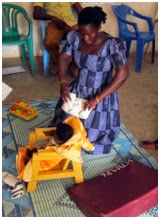In
May 2014 my colleague Diane Lyle and I, both of us paediatric physiotherapists
from the UK, were fortunate enough to be asked to volunteer on a training
assignment in Sandema, in the far north west of Ghana for the Scottish charity
Cerebral Palsy Africa - www.cerebralpalsyafrica.org - in conjunction
with CBM and Afrikits -www.afrikids.org/ghana
Our
2 week course was also supported by two Ghanaian physiotherapists, Charity
Adjety from Accra and Judith Arthur from Kumasi. Its purpose was to give 21 Community
Based Rehabilitation officers (CBR), special education officers and health
professionals insight and more understanding into the complexities of Cerebral
Palsy (CP) and how to handle and help children with CP, how to support their
families and how to include them within their communities.
The
trainees learn about good handling and positioning and how to motivate children with CP to become
more active. Here they are advising a mother.
Constructing a supportive chair
from a cardboard box for a child with CP
Learning
how to carry and feed children with CP
and get them onto the mother’s back more appropriately
Cerebral Palsy is a
condition, caused by damage to the developing brain (e.g. complications during
birth, jaundice after birth or infections through meningitis or Cerebral
Malaria). This damage can result in problems with movement and posture, communication,
feeding/eating, seizures, learning, and behaviour. There is no cure for CP, but
much can be done to help children to develop their full potential and include them
into their communities, in spite of their disability. Early detection is vital and can make a big
difference to the long term outcomes for children with CP.
The course was well
attended and everybody joined in with whatever there was on offer. Much was
learned, not just by the trainees and we all enjoyed working together.
A 2nd course was run, in parallel with ours, for mothers and volunteers. They were trained by Veronica Hansen Nortey, Jean Westmacott and Ama Darko Williams to make assistive devices for their children with CP (e.g. special supportive chairs) from cardboard – Appropriate Paper- Paper Technology (APT)




Our trainees learned how such devices can make children more functional and include them in schools
Renate Hallett, Nottingham
UK















































